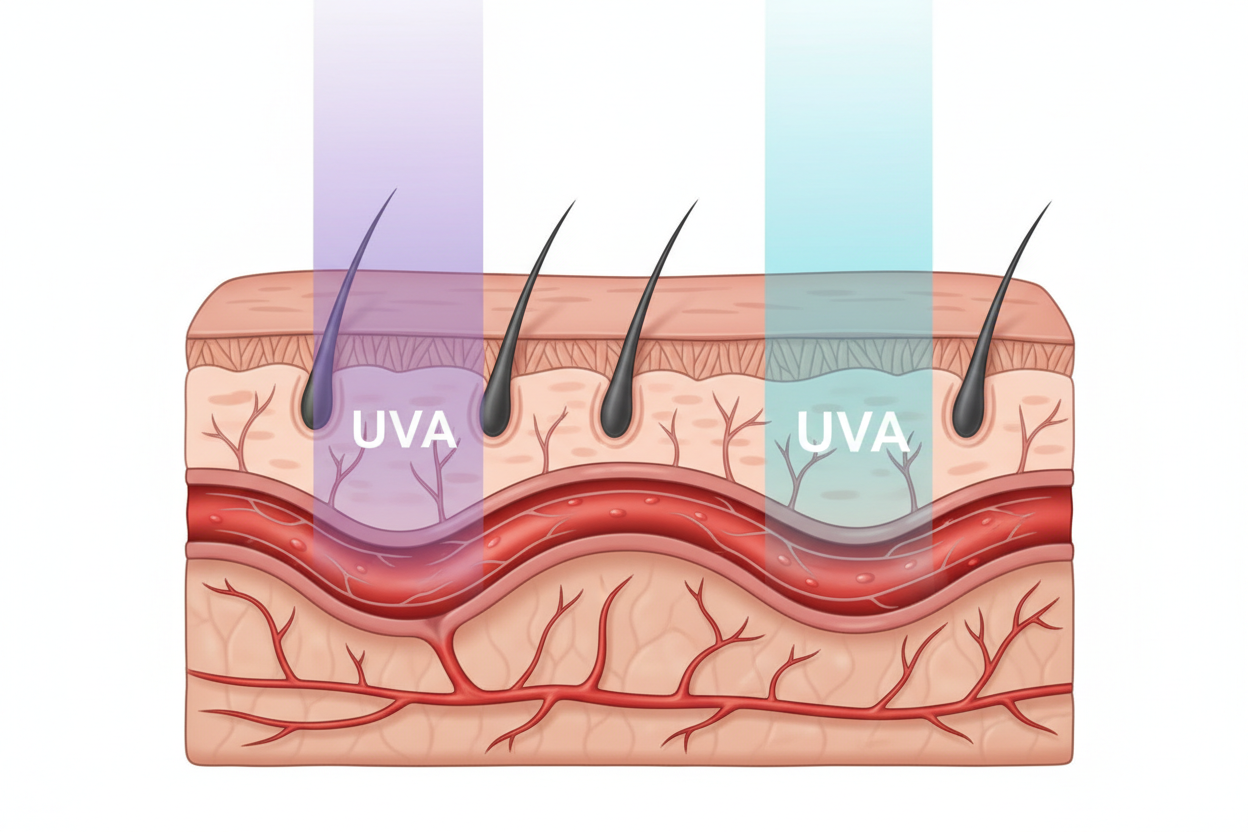Introduction
Adrenal fatigue is a condition that has been attracting increasing attention recently. It manifests as chronic fatigue, insomnia, digestive problems, mood swings, and other nonspecific symptoms. Many sources state that the main cause is reduced adrenal gland function. However, the reality is more complex. Adrenal fatigue is essentially a brain problem, specifically disrupted signaling in the paraventricular nucleus (PVN) of the hypothalamus. If we want to treat this condition effectively, we must focus on the causes within the central nervous system.
What is the paraventricular nucleus and what is its function?
The paraventricular nucleus (PVN) is a key area of the hypothalamus that connects the nervous, endocrine, and immune systems. It functions as a control center that receives signals from various parts of the body and, based on them, regulates the activity of important organs, including the adrenal glands. If the function of the PVN is disrupted, it leads to an imbalance throughout the organism, which externally manifests, among other things, as adrenal fatigue.
Symptoms of impaired PVN function
Dysfunction of the PVN can manifest in various ways. The most common symptoms include:
- Chronic fatigue and exhaustion
- Insomnia and poor quality sleep
- Digestive issues such as bloating, diarrhea, or constipation
- Mood swings, depression, anxiety
- Memory and concentration disorders
- Headaches and migraines
- Reactive hypoglycemia
Causes of adrenal fatigue
The main cause of disrupted signaling in PVN is an unhealthy lifestyle. This includes stress, lack of sleep, improper diet, lack of physical activity, and other factors. The hormone leptin plays a significant role here, providing the brain with information about the body's energy status.
Leptin is produced by fat cells, and its level changes according to food intake - it decreases during fasting and increases during overeating. It thus serves as a signal of energy availability. However, if leptin signaling is disrupted over a long period (for example, by consuming large amounts of sugars and industrially processed foods), it gradually leads to damage to the PVN and the development of adrenal fatigue.
The effect of blue light on leptin
Recent research shows that light, especially its blue component, also affects the production and signaling of leptin. Exposure to blue light in the evening hours disrupts the natural nighttime production of the hormone melatonin. Melatonin, in turn, plays an important role in regulating leptin.
If we are exposed to blue light from artificial sources (such as computer screens, tablets, mobiles, or LED bulbs) for a long time, the nighttime secretion of leptin is suppressed. This disrupts one of the key signals the brain uses to assess the body's energy balance. The consequence is again a weakening of PVN activity and the development of adrenal fatigue symptoms.
The Influence of Circadian Rhythms
The activity of the PVN and the entire organism is regulated by circadian rhythms – cycles of wakefulness and sleep that repeat approximately every 24 hours. These rhythms are controlled by specialized "clocks" in the brain (suprachiasmatic nuclei) and influenced by external signals, especially the alternation of light and darkness.
Modern times have brought artificial lighting and an excess of blue light emitted by electronic screens. This light, if we are exposed to it in the evening hours, disrupts the natural production of melatonin and thus throws off our internal clock. The result is difficulty falling asleep, poor quality sleep, and other problems.
The solution may be a special biodynamic CLOCK 3 in 1 bulb. It can faithfully mimic natural daylight and thus supports healthy circadian rhythms. The CLOCK 3 in 1 bulb offers three lighting modes:
1. Daylight - invigorating, suitable for the active part of the day
2. Morning and Evening Light - soothing, without the blue component that disrupts melatonin production
3. Night light - dim red light that does not disturb sleep even during nighttime trips to the bathroom
Using the CLOCK 3 in 1 biodynamic lighting can significantly contribute to the restoration of natural circadian rhythms and thus to the treatment of adrenal fatigue.
Circadian disorders can lead to the development of adrenal fatigue because the PVN closely cooperates with the suprachiasmatic nuclei, and its function depends on the proper timing of signals. If our internal clocks are permanently misaligned, it will gradually reflect on adrenal health as well.
Influence of alcohol
Alcohol is another factor that can contribute to the development of adrenal fatigue. The ethanol contained in alcoholic beverages suppresses the activity of the PVN and disrupts the delicate balance of the autonomic nervous system.
Regular consumption of alcohol, even in small doses, chronically burdens our regulatory mechanisms and leads to their failure. The brain stops responding adequately to stress, and the body finds itself in a state of constant stress, even if we may not fully realize it.
Adrenal Fatigue Diagnosis
Adrenal fatigue cannot be reliably diagnosed using standard blood tests. Even adrenal function tests (such as the salivary cortisol test) are not entirely conclusive because they do not reveal the primary cause of the problems – dysfunction at the brain level.
For an accurate diagnosis, a comprehensive view and assessment of all symptoms, lifestyle, and other factors are necessary. Indicators may include, for example, elevated levels of pro-inflammatory cytokines, reduced heart rate variability, or disrupted circadian rhythm of hormone production.
A very beneficial method is continuous five-day measurement using the Firstbeat system. This technology uses a special chest strap with ECG sensors that records heart activity in real time. From the measured data, a number of valuable indicators can then be derived:
- The level of stress and recovery throughout the day and night
- Quality and depth of sleep
- Proportion of individual sleep phases (REM, deep sleep...)
- Overall level of body regeneration
- Training load and exercise effectiveness
Five-day monitoring can detect even hidden disorders of the autonomic nervous system, which are the basis of adrenal fatigue. The obtained data provide valuable guidance for directing treatment and lifestyle adjustments. Repeated measurements after 3-6 months then allow for an objective assessment of the effectiveness of the chosen measures.
Treatment of adrenal fatigue
In the treatment of adrenal fatigue, it is necessary to focus on restoring the proper function of the HPA axis and the entire brain. A key aspect is adjusting lifestyle habits:
1. A healthy diet based on the principle of Real, Local, and Seasonal foods. These foods naturally contain the most nutrients and the least toxins. The emphasis should be on sufficient quality proteins, healthy fats, and vegetables. Conversely, it is advisable to limit sugars, industrially processed foods, and potential allergens.
2. Regular sleep of sufficient length and quality, supported by proper sleep hygiene. Limiting exposure to blue light in the evening hours, for example by using the biodynamic CLOCK 3 in 1 bulb or wearing glasses that block blue light.
3. Managing stress through relaxation techniques, meditation, and adequate physical activity.
4. Support of circadian rhythms by properly timing meals, sleep, and light exposure. Limiting alcohol consumption.
For targeted support of adrenal function, it is advisable to include the product NERVY. It contains a carefully selected combination of B vitamins, magnesium, and adaptogenic herbs (ginseng, eleuthero) that nourish the nervous system and strengthen resistance to stress. Regular use of the NERVY supplement can thus accelerate adrenal regeneration and alleviate symptoms of adrenal fatigue.
As supplementary means, KLID A SPÁNEK products can be used, which specifically nourish the individual branches of the autonomic nervous system, namely the sympathetic and parasympathetic systems.
Psychotherapy is also important, as it helps process accumulated stress, learn to manage stressful situations more healthily, and overall support brain regeneration.
Conclusion
Adrenal fatigue is a complex condition whose true cause is disrupted signaling in the brain, not just adrenal gland dysfunction. A significant role is played by disruption of circadian rhythms, excess blue light (which disrupts leptin secretion), and alcohol consumption.
In diagnostics, it is very beneficial to use continuous five-day monitoring with the Firstbeat system, which can detect hidden disorders of the autonomic nervous system and provide valuable guidance for directing treatment.
As part of the therapy, it is necessary to focus on restoring the proper functioning of the central nervous system, especially the paraventricular nucleus of the hypothalamus. The key to success is a lifestyle adjustment that includes a diet based on the principle of Real, Local, and Seasonal foods, quality sleep (supported by the use of the biodynamic CLOCK 3 in 1 bulb), stress management, and support of natural biorhythms. For targeted nutrition of the adrenal glands and nervous system, it is advisable to use the NERVY preparation. Additionally, the autonomic nervous system can be supported with the KLID A SPÁNEK products.
If we manage to restore healthy brain function, it will have a positive effect on the entire body and the symptoms of adrenal fatigue will gradually subside. It is a long-term process that requires patience and strong will. However, the result will be a significant improvement in health, quality of life, and overall resilience to the pressures of modern times.





Leave a comment
This site is protected by hCaptcha and the hCaptcha Privacy Policy and Terms of Service apply.